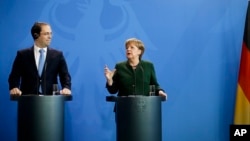German Chancellor Angela Merkel told her Tunisian counterpart on Tuesday she wanted to speed up repatriation of failed asylum seekers after a rejected Tunisian awaiting deportation killed 12 people at a Berlin market.
Merkel, weakened by her open-door migrant policy which has allowed more than a million refugees into Germany in the last two years, is trying to reassure voters about security and the refugee crisis before a federal election in September.
Shortcomings in the system were exposed in December when Islamic State supporter Anis Amri, a Tunisian who had been denied asylum six months before and was on a watch list, drove a truck through a Berlin Christmas market and killed 12 people.
Merkel made clear after talks with Prime Minister Youssef Chahed that she needed Tunisia's cooperation.
"We discussed how the repatriation of people can be improved ... how to make voluntary repatriation more attractive, by offering education, help to get started," she said, adding that about 1,500 of the 30,000 Tunisians in Germany were not allowed to stay.
"It must be clear that the others will be deported involuntarily. We must be quicker about that and we're talking to Tunisia," she said. Last year, some 116 failed asylum seekers were sent back to Tunisia, she said. "That is not enough."
Acknowledging that Germany and Tunisia were both targets for international terrorists and "tragically" linked by the Berlin attack, Merkel said they had to share security information. The two leaders earlier laid flowers at the site of the attack.
In a newspaper interview, Chahed rejected criticism that Tunisia was slow to take back failed asylum seekers from Europe, including Amri.
"The biggest problem for Europe is refugees who go from Libya to Italy," he told Bild, adding that German authorities needed to provide the correct paperwork to be able to send back failed asylum seekers to Tunisia.
A bureaucratic delay prevented Amri's deportation. He was shot dead by Italian police in Milan on December 23 after fleeing from Berlin through the Netherlands and France.
"Illegal immigrants who use false papers sometimes make things difficult and prolong the process," he said. Chahed also rejected the idea of Tunisia setting up its own asylum centers to ease the burden on Europe.
"Setting up camps or reception centers was not an issue (in our talks)," Chahed told reporters. Earlier, he had told Bild that Tunisia did not have the capacity to create refugee camps.
Merkel also reiterated she wanted to seal migrant deals with Tunisia and other north African countries, similar to an EU-Turkey pact, to help stem the flow of refugees to Europe.
Critics say the EU-Turkey migrant deal has made Merkel beholden to Turkish President Tayyip Erdogan.
Senior opposition Green lawmaker Katrin Goering-Eckardt said Merkel was acting "as if she can make dirty deals with Libya or Tunisia after the dirty deal with Turkey."





